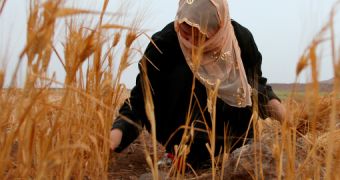The World Bank now claims that, according to their latest assessment of how climate change and global warming are to reshape agricultural practices and economies across the globe, the Arab world should expect to be hit the hardest.
This is because, as several studies have shown, average temperatures in this part of the world are to increase by as much as 3 degrees Celsius (5.4 degrees Fahrenheit) by the year 2050.
Moreover, the World Bank expects that both the Middle East and North Africa are to experience ever more frequent extreme weather manifestations such as droughts and flash floods, which will do little except impair these regions' ability to grow crops as efficiently as they used to in the past.
As the World Bank explains, the changes that are expected to take place in the local climate will limit the farmers' access to fresh water.
In addition, those who are in the business of growing crops will also have to face new pests and a drop in soil fertility.
The specialists working with the World Bank explain that, according to this scenario, the poor people living in these regions will be the first to experience the negative consequences of a warming planet.
Thus, out of as many as 340 million people in the Arab region who are to be affected by climate change, roughly 100 million, who also happen to be the poorest, will have a much more difficult time trying to adapt to the new environmental conditions they will be forced to live in.
“Climate change is a reality for people in Arab countries. It affects everyone – especially the poor who are least able to adapt – and as the climate becomes ever more extreme, so will its impacts on people’s livelihoods and wellbeing,” argued the World Bank Vice President for the Middle East and North Africa region, Inger Anderson.
“The time to take action at both the national and regional level in order to increase climate resilience is now,” the vice president went on to add.
This report was released during the UN climate talks in Doha.

 14 DAY TRIAL //
14 DAY TRIAL //